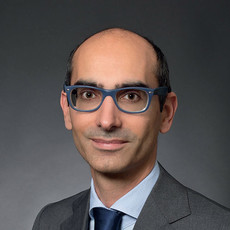
Climate change: the crucial role Asset management has to play

Through our voting policy, we insist that the climate impact of decisions taken at general assemblies are more clearly established.
Climate change is a difficult reality for all of us, whether we like it or not. Time is flowing in one direction only and the generations that follow us are asking questions. Questions that need answers. As economic players — asset managers, banks, investment institutions, businesses, regulators — we need to join forces to address the major challenge of combatting climate change before it is too late.
A global asset manager is in a privileged position, able to influence the companies in which they invest and help redirect capital flows towards more sustainable investment solutions.
They must include sustainability in their DNA, even if it means implementing sometimes radical changes. How then can we place climate issues at the heart of strategic planning?
The answer lies in formalising climate policies and detailing the complementary levers that can be implemented: divestment from certain classes of fossil fuels, the development of innovative solutions for the climate transition, acting as committed and responsible shareholders and assessing the climate risk of portfolios.
The first step concerns divestment from thermal coal. Indeed, if it is necessary to invest in low-carbon energies in order to meet the commitments of the Paris Agreement, coal divestment has become indispensable in the fight against climate change. For example, Lyxor has committed to the divestment of its funds from thermal coal while strengthening its dialogue with companies in relevant sectors in order to encourage them towards greater transparency and better consideration of the related risks and possible opportunities presented by climate change. A successful transition will not be managed solely through exclusion.
The second aspect relates to the core business of asset management: the design of investment solutions offering a comprehensive range of options that engage with climate change, as well as clients’ expectations, regardless of their specific investor profiles. Specifically, this means assessing all asset classes through varying methodologies be it sustainability, ESG integration or the selection of impact funds.
Lyxor integrates the United Nations Sustainable Development Goals (SDGs) via its monothematic approach, which we believe is the most relevant and credible way of helping to contribute to these objectives: focusing on climate change, new energy, clean water and sanitation, and so on. Today, we have more than €3.5 billion in assets under management in line with these sustainable themes. Innovation and differentiation is necessary to avoid replicating existing models, like the first and only ETF in the world based around “green bonds,” which was launched by Lyxor. This benefits from an active search process within a passive management product. This product has an impact reporting process that incorporates indicators on emissions avoided or on treated water and energy savings. ESG and innovation are fully compatible and the range of possibilities still to be covered is significant.
Favouring low carbon energy in investments is a necessity in the continued fight against climate change. Here, the transport of wind turbine blades.
The third axis of a climate strategy concerns active voting: it is essential to act as a committed and responsible shareholder. This requires a shareholder engagement policy that expresses the expectations of the issuers in which the manager invests, in order to guarantee that the broader, non-financial issues they need to address are taken into account and dealt with in a transparent manner. In advance of General Meetings, Lyxor conducts a proactive dialogue with companies and pursues its thematic commitment on environmental, social and governance issues through voting. This policy now has a strong climate component, in view of the fact that we can no longer wait in addressing this issue. Through our voting policy, we insist that the climate impact of decisions taken at general assemblies are more clearly established.
Finally, the capacity to assess climate risks and their communication to customers also needs to be considered. This requires the development of in-depth evaluation and reporting methods for the ESG and Climate components of portfolios. The process of taking climate change into account in our sector will continue to expand and we will likely experience a real revolution with the provision of new climate assessments. It will soon be possible to calculate climate change alignment or non-alignment of all indices and market portfolios. In all the major indices used by investors, our methodologies point to scenarios resulting in the order of 4 or 5 degrees of global warming — an unpleasant surprise for well-meaning investors! However, while responsible investment policies often remain complex to understand, it is relatively easy to understand the notion of temperature change and its consequences, and thus draw the necessary conclusions required for a sound investment strategy.
This expected tsunami of new approaches is a positive trend because it will promote the creation of innovative investment vehicles allowing customers to invest in high quality green products, as well as in vehicles that remain in alignment with the Paris Climate Agreement. Investors will be able to reallocate their capital with full knowledge of its final impact and thus be “responsible” in their participation in climate change. Issuers will advance in their energy and ecological transition at an accelerated rate.
As for the current health crisis, it will have a definite impact and will create new topics, and perhaps opportunities, for discussion with companies. The social “S” of ESG will clearly take on much more significance than it has done previously.




